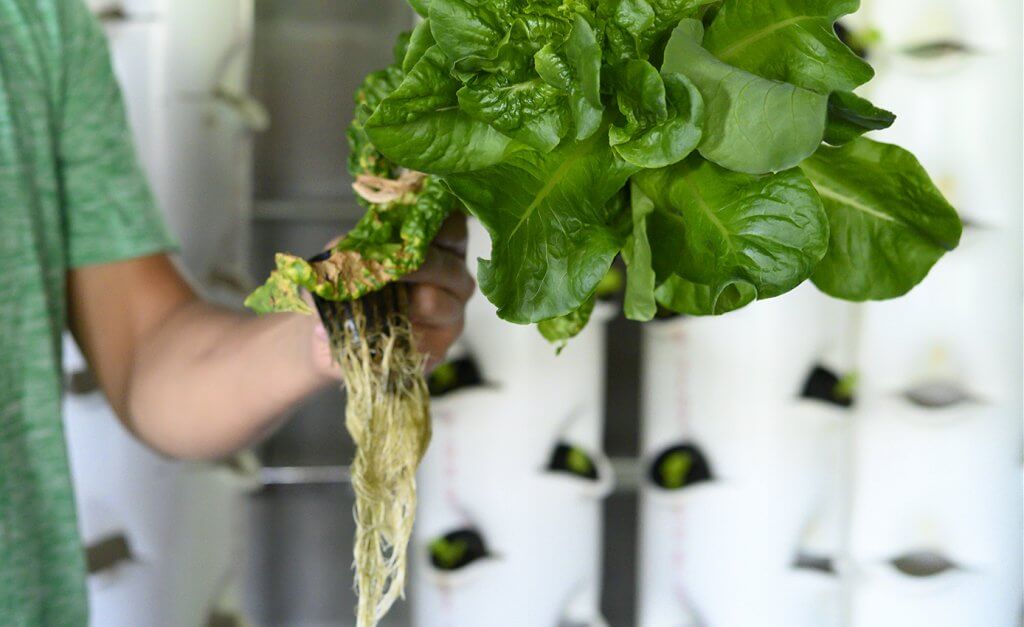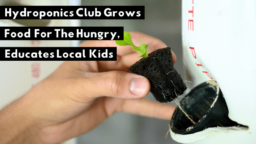With the global population approaching 8 billion and more people migrating to urban areas, it’s become clear that traditional agriculture is not the most sustainable way to grow produce.
Simply put, to feed the rising population, the world is going to need to start growing significantly more food. And doing so through traditional farming would require more land, which currently would be hard to find. It would likely result in cutting down much of the world’s remaining forests, peatlands and wildlife areas, which would release the carbon currently stored in them and further contribute to climate change.
The Hydroponics Club at the University of Pittsburgh figured this out years ago.
Instead of sleeping in, club members spend weekend afternoons tucked away in a garage on the east side of Pittsburgh, building hydroponic systems and growing fresh greens to feed hungry members of their community.

In short, hydroponics is the method of growing crops in nutrient-rich water instead of soil. After harvesting the crops, the water in which they grew can be reused, and the nutrients can be recycled.
“It’s a very sustainable way of growing crops,” said club president Luke Persin.
“You typically don’t need to use any pesticides or herbicides,” he continued. “You can grow crops at a way higher density, you can get higher yields and you’re using about a tenth of the water that traditional agriculture would use.”
Additionally, hydroponics can be used to grow crops in urban areas closer to consumers, thus reducing the amount of carbon emitted while transporting the greens.
Feeding their neighbors
In a heated environment, hydroponic systems can grow plants all year round. But since Pitt Hydroponics is primarily operating out of a garage gifted to them by a local church group, growing season is still limited by the weather.
During the warmer months, however, the club grows leafy greens — primarily lettuce and kale. And a significant portion of what the group grows is donated to the Pitt Pantry, the university’s food bank, where low-income students can pick up food for free.

Outside of the garage, some members operate a hydroponic system at the nearby Community Human Services. They contribute the lettuce to the CHS Food Pantry, which feeds over 800 families in Pittsburgh’s South Oakland neighborhood.
Helping other students and schools
Because it’s operating at such a small scale, an integral part of the club’s mission is outreach.
“We know we aren’t going to go out there and end hunger in the Pittsburgh area. We don’t have the operation or the means to do that,” said Persin. “The main idea is that we want to spread the word about hydroponics.”
Locally, the club has been working with middle schoolers at the nearby Community Day School, helping them design and construct a hydroponic system that can be moved from classroom to classroom.
“It’s been helpful for the team to come in and show us,” Molly Muffet, Community Day School’s sustainability coordinator, said in a statement.
Initially, Muffet explained, the system will be used to grow lettuce. But in the spring, she predicts it will be used to grow parsley for Passover. And, maybe, they’ll eventually use it to grow cherry tomatoes as snacks.
On campus, the club offers “build a mini-system” nights, where other students can learn how to construct their own hydroponic systems and use them to grow crops in their dorm rooms or off-campus apartments. Group members are also mulling over the idea of installing hydroponic systems in some of the most popular spots on campus, thus increasing student interest and crop yields.
“We really want to teach people rather than naively think that we are going to be able to solve the problem … ourselves,” said Persin.
Although the club’s outreach hasn’t yet extended beyond the greater Pittsburgh area, Persin strongly encourages students across the nation who are interested in starting their own campus hydroponics club to reach out.
“If other students at other universities are interested in doing what we do, we have our website and our Facebook group, and we’re really responsive to any questions,” Persin said. “If anyone is trying to get started up, we will gladly give them feedback.”



